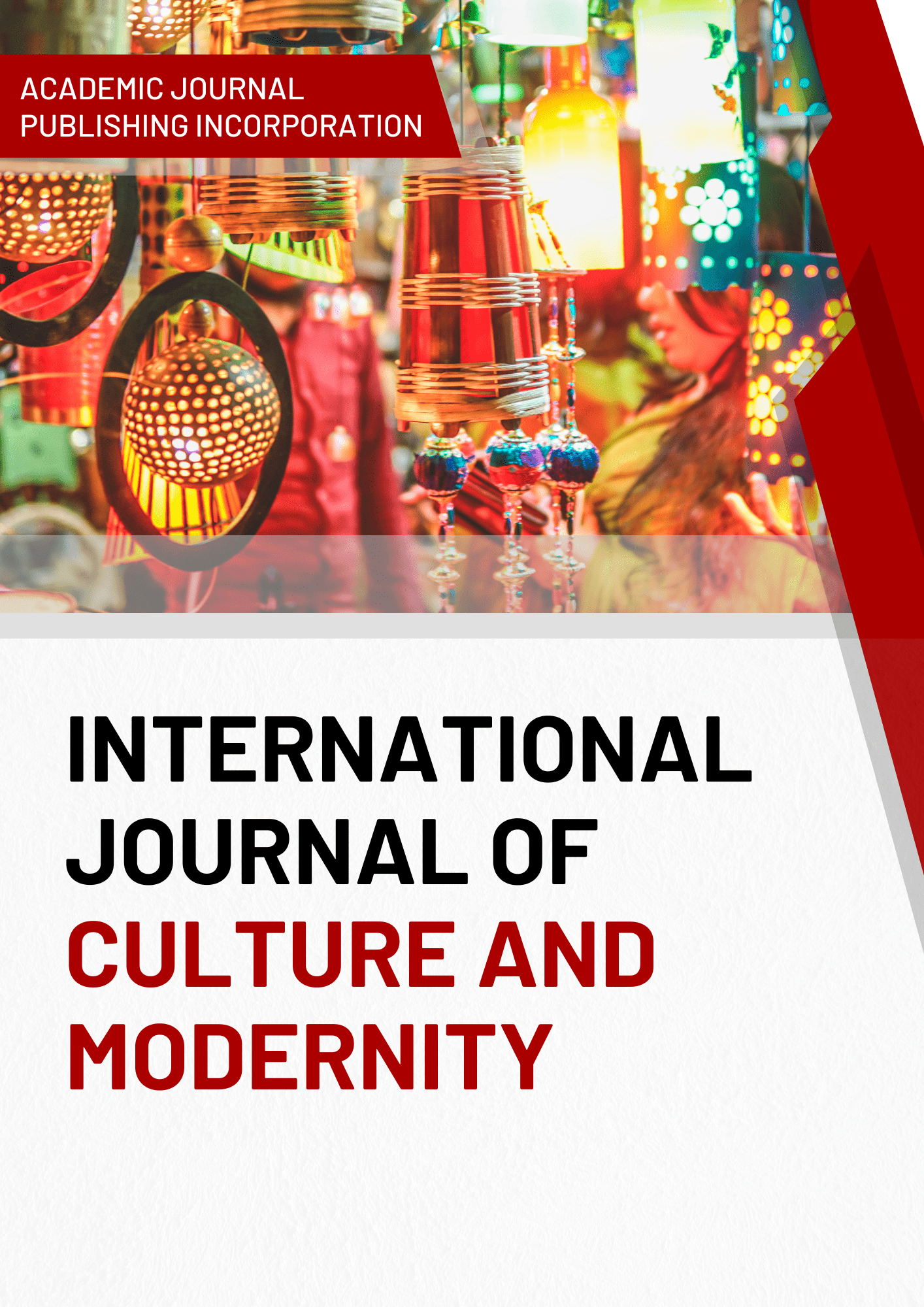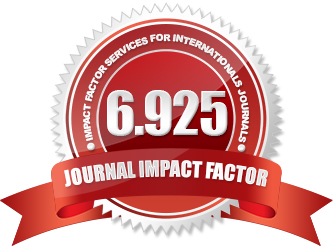The Position of Linguomadaniy Codes in the Frasemas
DOI:
https://doi.org/10.51699/ijcm.v17i.384Keywords:
cultural code, phrase, linguoculturology, cultureAbstract
This article discusses the linguocultural features of the phrases in Shukur Kholmirzaev's stories. The cultural codes on which they are based have been analyzed.cultural code
References
Bolshoy frazeologicheskiy slovar russkogo yazyka. Znachenie. Upotrebleniye. Kulturologicheskiy kommentariya. / Otvetstvennyy redaktor V. N. Teliya. – M.: AST-PRESS KNIGA, 2006
Gudkov D.B., Kovshova M.L. Telesnyy kod russkoy kultury. – M.: Gnozis, 2007
Kononenko B.I. Bolshoy tolkovyy slovar po kulturologii. – M.: Veche, 2003
Krasnyx V.V. Kody i etaloni kultury (priglashenie k razgovoru) // Yazyk, soznanie, kommunikatsiya: Sb. statey. –M.: MAKS Press, 2001
Krasbayeva-Chyornaya J. V. Prostranstvennyy kod kultury tsennostnoy kartiny mira (na materiale russkoy, ukrainskoy, angliyskoy i nemetskoy frazeologii) // Sibirskiy filologicheskiy jurnal. – 2018. – №4.
Lingvesticheskiy entsiklopedicheskiy slovar. – M., 1990
Maslova V.A. Lingvokultologiya. Ucheb. posobie - M. ; Akademiya, 2001
Mahmudov N. O'xshatishlar – obrazli tafakkur masalalari // O'zbek tili va adabiyoti. – Toshkent, 2011. – №3.
Rahmatullaev Sh. O'zbek tilining izohli frazeologik lug'ati. – T.: Oʻqituvchi, 1978
Xudayberganova D. S. O'zbek tilidagi badiy matnlarning antropotsentrik talqini: Filol. fan. d-ri ... dis. – Toshkent, O'R FA TAI, 2015.
Xudayberganova D. Til. Tafakkur. Madaniyat: Ilmiy risol. D. Xudoyberganova. – Toshkent: Nodirabegim, 2020.
Shavkat Rahmatullaev. O'zbek tilining etimologik lugati. 1-jild (turkiy so'zlar). –Toshkent: Universitet, 2000
Mamamjonov, M. (2019). Фольклор асарлари персонажлари исмларининг дискурс релеванти сифатида қўлланилиши. Буюк ипак йўлида фольклор санъатининг ривожланиш жараёнлари.
Gulbakhor, R. (2020). Expression of temporality and locality through noun lexemes in Mahmud Kashgari's “devon”. ACADEMICIA: An International Multidisciplinary Research Journal, 10(11), 1648-1653.
kizi Yusupova, S. T. (2019). STUDY OF RELIGIOUS FUNCTIONAL STYLE IN THE WORLD LINGUISTICS. Scientific Bulletin of Namangan State University, 1(12), 173-178.
kizi Yusupova, S. T., & Sayidrahimova, D. S. (2022). ABOUT THE CLASSIFICATION OF RELIGIOUS TEXTS. Eurasian Journal of Academic Research, 2(2), 63-65.
MAMAJONOV, А., & ROZIKOVA, G. (2018). Stylistics expressive speech system. Scientific journal of the Fergana State University, 1(4), 69-71.
Qizi, Y. S. T. (2020). Religious speech and phonetic interference. ACADEMICIA: An International Multidisciplinary Research Journal, 10(6), 679-683.
ROZIKOVA, G. (2018). Non-traditional communication as a methodics instrument. Scientific journal of the Fergana State University, 1(3), 116-117.
Rozikova, G. Z. (2019). SEMANTIC FEATURES OF LEXEMES BELONG TO THE GROUP OF NAMES OF PERSON APPLIED IN “DEVONU LUGOTIT TURK”. Scientific Bulletin of Namangan State University, 1(12), 136-141.
Rozikova, G. Z., & Yusupova, S. T. (2021). METAPHOR AS A LINGUOCULTUROLOGICAL PHENOMENON. Theoretical & Applied Science, (12), 1086-1088.
Roziqova, G. (2020, December). MAHMUD KASHGARI'S" DEVONU LUG'OTIT TURK" NAMES OF HOUSEHOLD ITEMS USED IN THE WORK EXPRESSIVE SYNONYM LEXEMAS. In Конференции.
Roziqova, G. (2021). MAHMUD KASHGARIS «DEVONU LUGOTIT TURK» AND MODERN UZBEK LANGUAGE. Theoretical & Applied Science, (5), 222-225.
Yusupova, S. T. (2019). CHARACTIRISTICS OF RELIGIOUS FUNCTIONAL STYLE OF THE UZBEK LANGUAGE. In АКТУАЛЬНЫЕ ВОПРОСЫ СОВРЕМЕННОЙ НАУКИ (pp. 20-21).
Yusupova, S. T., & Anvarova, F. A. (2020). Linguoculturological investigation of zoonyms in English and Uzbek. ISJ Theoretical & Applied Science, 11 (91), 78-80.
Мамажонов, А., & Розиқова, Г. (2004). Гапларнинг шаклий-мазмуний тузилишига кўра турлари. Фарғона, 2004. Б, 8.
Розикова, Г. З. (2016). Изучение процесса нормирования узбекского литературного языка синергетическим и квантитативным методами. Ученый XXI века, 32.
Zaylobidinovna, R. G. ., & Shavkatjonovna, Y. S. . (2022). LEXICAL-SEMANTIC ANALYSIS OF BUSINESS WORDS IN ENGLISH AND UZBEK. Modern Journal of Social Sciences and Humanities, 5, 61–65
Zaylobidinovna, R. G. ., & qizi, T. G. A. . (2022). COMPARATIVE ANALYSIS OF ADJECTIVES IN ENGLISH AND UZBEK LANGUAGES. Modern Journal of Social Sciences and Humanities, 5, 66–70.
Kuldashev, N., Avazbek, D., & Parviz, A. (2022). Opinions of Our Ancestors on Language and Speech Purity. Journal of Ethics and Diversity in International Communication, 2(4), 10-16.
Maftuna, G. (2022). Methodology of Organizing Problem Lessons in Higher Education. International Journal of Culture and Modernity, 14, 72-77.
Kuldashev, N. ., Parviz, A. ., & Avazbek, D. . (2022). Fazli Namangani’s “Majmuai Shoiron” Review Zullisonayn Issue. Spanish Journal of Innovation and Integrity, 6, 429-433.
Gulrux, J. ., Maftuna, G. ., E’zozxon, O. ., Muhabbat, U. ., & Abdumalik, S. . (2022). The Method of Onomastic Conversion in the Formation of Toponimes in the Fergana Region. Spanish Journal of Innovation and Integrity, 6, 451-456.
Ibragimova, E. I. (2020). Aesthetic function of relationships of the addressant. ISJ Theoretical & Applied Science, 05 (85), 101-104.
Sayyora, Q. (2022). FORMATION OF TEXT ANALYSIS IN LINGUISTICS. Modern Journal of Social Sciences and Humanities, 4, 58-61.
Ismoil, H. ., Mukhtorali, Z. ., Jumaboy, J. ., & Parviz, A. . (2022). WORD FORMATION FROM THE TAJIK BORROWINGS. Modern Journal of Social Sciences and Humanities, 5, 71–76.
Zokirov, M. T. (2021). To typology of language situations. ISJ Theoretical & Applied Science, 11 (103), 706-710.
Turdaliyevich, Z. M. (2022). About Grammatical or Morph syntactic Interference. European Multidisciplinary Journal of Modern Science, 4, 768–773.
Зокиров, М. Т. (2015). Об общей характеристике билингвизма. Учёный XXI века, (7-8 (8-9)), 24-27.
Зокиров, М. Т. (2017). ТИЛШУНОСЛИК ВА ТАРИХ. Актуальные научные исследования в современном мире, (4-2), 45-49.
Turdaliyevich, Z. M. (2022). To the Question of the Study of Arabisms in the Persian Language. Spanish Journal of Innovation and Integrity, 5, 566-570.
Turdaliyevich, Z. M., & Shukrona, A. (2022). About Turkish-Uzbek Vocabulary Words in the Lexical Structure of the Tajik Language. Spanish Journal of Innovation and Integrity, 5, 620-624.
Mukhtorali Turdaliyevich Zokirov, Sohiba Mukhtoraliyevna Zokirova (2021). About The Influence Of The Uzbek Language In Rishtan Tajik Dialects Of Ferghana Region. Turkish Online Journal of Qualitative Inquiry (TOJQI 12 (4), 115-122.
Turdaliyevich, Z. M., & Ergashevna, S. S. (2022). About the “Space” and “Time” Philosophical and Language Categories. International Journal of Culture and Modernity, 13, 96-100.
Zokirov, M. T., & Ibragimova, M. S. N. (2021). Alisher Navoi about style problems. ISJ Theoretical & Applied Science,(12), 601-604.
Turdalievich, Z. M., & Mukhtoralievna, Z. S. (2007). (nd). UDK: 398.221 specific features of language interference in contrastive linguistics.
Zokirov, M. T., & Zokirova, S. M. (2020). On researching phonetic level of the languages. GIS Business, 15(6), 148-154.
Turdaliyevich, Z. M., & Farhod, I. (2022). Loiq Is the Successor of the Great Figures Of Tajik Literature. International Journal of Culture and Modernity, 14, 51-55.
Zokirov, M. T. (2021). MASTERY OF USING TABOOS AND EUPHEMISMS BY ABDULLAH QADIRI. Theoretical & Applied Science, (5), 112-115.
FARG‘ONA, M. T. L. V., & TILSHUNOSLIGI, D. U. O. Z. ILMIY ISHLAR TO ‘PLAMI.







